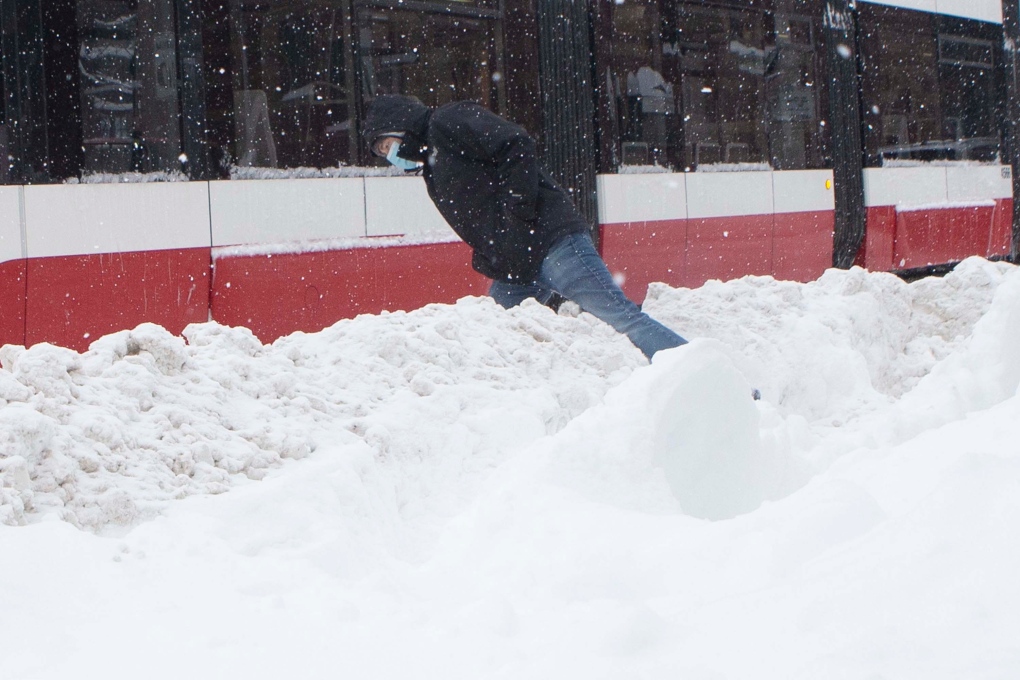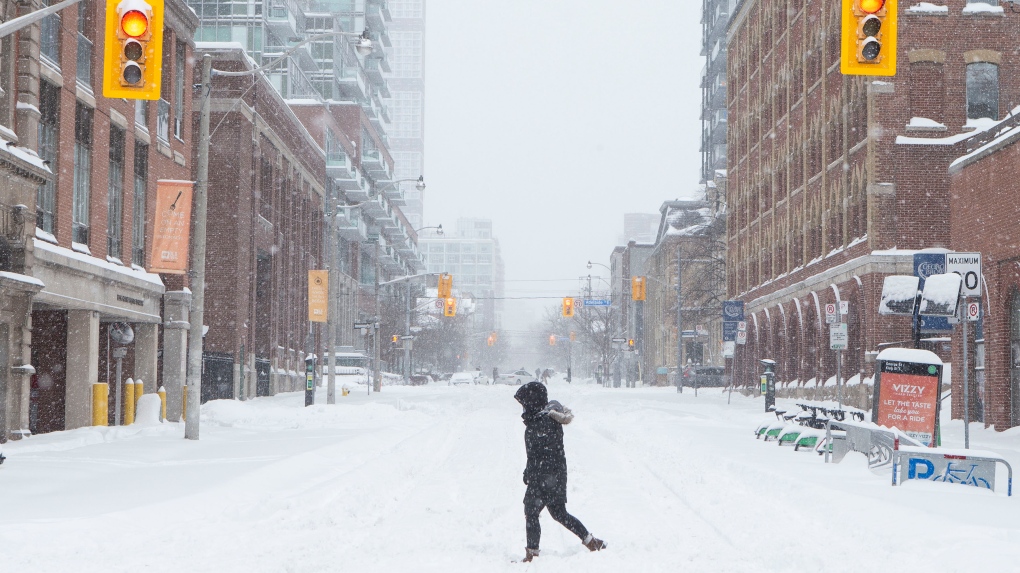Snow removal after Toronto's massive winter storm in January cost city $17M
 A man crosses over a snowbank in downtown Toronto as a heavy snowfall affects the greater Toronto area on Monday January 17, 2022. THE CANADIAN PRESS/Chris Young
A man crosses over a snowbank in downtown Toronto as a heavy snowfall affects the greater Toronto area on Monday January 17, 2022. THE CANADIAN PRESS/Chris Young
Removing the 55 centimetres of snow that fell over a period of just 15 hours during a major winter storm in Toronto this past January cost the city more than $17 million, or close to 20 per cent of its annual winter maintenance budget, according to a staff report released this month.
The 2022 major snow event post operational report, which was authored by the city's general manager of transportation services, found that the rapid snow accumulation during the Jan. 16-17 storm combined with prolonged frigid conditions in the weeks that followed created a "unique set of challenges for storm cleanup."
The report indicates that 180,000 tonnes of snow was removed from streets, sidewalks, and bicycle paths at a cost of more than $17 million.
"None of the existing council-approved service levels accounts for extreme weather events, and therefore the levels do not set a feasible response time for a storm of the magnitude experienced in January," the report read.
"In addition, a number of challenges were experienced as a result of the storm including supporting the immediate needs of emergency services, digging out TTC vehicles, strain on equipment, manual clearing to avoid infrastructure and property damage, logistics of removing and relocating the volume of snow as quickly as possible, some contractor issues and communicating service levels and response times."
The report states that while improvements have subsequently been made to the existing services, the storm highlighted a need for the development of an Extreme Winter Weather Response Plan with updated service levels.
The winter event resulted in snowfall amounts that exceeded the total accumulation in January, February, and March of 2021 and it was one of the top ten single largest snowfall events ever recorded in the city.
 A person walks across a street in downtown Toronto as a heavy snowfall affects the greater Toronto area on Monday January 17, 2022. THE CANADIAN PRESS/Chris Young
A person walks across a street in downtown Toronto as a heavy snowfall affects the greater Toronto area on Monday January 17, 2022. THE CANADIAN PRESS/Chris Young
Some of the hurdles faced by city crews included equipment breakdowns due to additional wear and tear and pandemic-related supply chain shortages that led to delays and disruptions for parts. Crews were forced to manually clear some areas to prevent damage to infrastructure and the extreme cold weather meant that crews were required to move at a slower pace. Storage capacity for the unprecedented amount of snow was insufficient on city streets, requiring crews to take loads of snow to other locations.
Resources were redeployed to help dig out nearly 500 TTC buses that had become stuck following the storm. An estimated 62,000 calls were received by 311 in relation to the weather event.
"The response to the storm from January 16-17 highlighted the need to address the increased range of responses required from Transportation Services during extreme weather, the impacts on all snow clearing from storms with total accumulation of well over 25 centimetres, and the need for increased coordination with supportive services for the most vulnerable," the report read.
"While storms of this magnitude are not usual for Toronto, other Canadian cities have developed response plans for this type of extreme weather."
Officials say the proposed plan will likely include new service level categories in addition to the existing ones.
Currently, the city prepares its response based on Type 1 snow events, which involve up to five centimetres of snow accumulation, Type 2 events, which involve five to 15 centimetres of accumulation, Type 3 events, which involve 15 to 25 centimetres of accumulation, and Type 4 events, which deal with accumulation above 25 centimetres.
"As global temperatures continue to rise and the world's climate continues to change, cities around the world are experiencing more extreme and unusual weather events. The incidences of extreme weather are expected to increase in frequency and severity in the years to come," the report read.
"Accordingly, Transportation Services is reviewing the storm level services of other comparable cities to develop service levels that address an additional two storm types."
The proposed plan may modify a Type 4 storm to include 25 to 35 centimetres, and add Type 5 storms, involving 35 to 50 centimetres of snowfall, and Type 6 events, which involves storms with more than 50 centimetres of accumulation.
"When storms of a Type 5 or 6 are forecasted, the proposed Extreme Winter Weather Response Plan would be activated along with Transportation Services area command centres, which will coordinate with the Office of Emergency Management as required," the report continued.
"Increased levels of operational communication are proposed that align with typical emergency response."
During the storm in January, residents in certain areas of the city, including parts of Scarborough, waited days before some residential streets in their neighbourhood were cleared.
On Tuesday, officials noted that the structure of new winter maintenance service contracts will likely improve snow removal response times across the city.
Under the new contracts, which begin in October and will run through to 2029, winter maintenance operations are divided into 11 geographic contract areas.
"These contracts will now require vendors to be responsible for winter maintenance on all infrastructure in a contract area including roads, sidewalks, and cycling facilities," the report read.
As for budgeting for big storms, officials said given the unique nature of each storm, it is difficult to plan for how much a major event will cost.
Officials said the winter maintenance budget typically accounts for storms and most years, the entire winter budget is not spent. In the event that a storm causes the department to go over budget, corporate financial planning has an emergency budget that can be tapped.
The report will be considered by the city's infrastructure and environment committee later this month and by city council at a meeting next month.
In a statement, Mayor John Tory said the report was requested to help the city "determine whatever lessons could be learned" to make sure that crews can react as quickly and efficiently as possible in the future.
"I have made it clear to Transportation Services that I want regular updates on the work underway to improve our extreme winter weather preparedness and response," Tory's statement read.
"This includes the development of an Extreme Winter Weather Response Plan, undertaking an internal review of snow removal operations, working with contractors to expand our service delivery, and establishing a dedicated snow-related 311 hotline that will give the city the ability to quickly scale up 311 capacity when needed."
Council will review the proposed Extreme Winter Weather Response Plan in early 2023.
CTVNews.ca Top Stories

Donald Trump says he urged Wayne Gretzky to run for prime minister in Christmas visit
U.S. president-elect Donald Trump says he told Canadian hockey legend Wayne Gretzky he should run for prime minister during a Christmas visit but adds that the athlete declined interest in politics.
Historical mysteries solved by science in 2024
This year, scientists were able to pull back the curtain on mysteries surrounding figures across history, both known and unknown, to reveal more about their unique stories.
King Charles III focuses Christmas message on healthcare workers in year marked by royal illnesses
King Charles III used his annual Christmas message Wednesday to hail the selflessness of those who have cared for him and the Princess of Wales this year, after both were diagnosed with cancer.
Mother-daughter duo pursuing university dreams at the same time
For one University of Windsor student, what is typically a chance to gain independence from her parents has become a chance to spend more time with her biggest cheerleader — her mom.
Thousands without power on Christmas as winds, rain continue in B.C. coastal areas
Thousands of people in British Columbia are without power on Christmas Day as ongoing rainfall and strong winds collapse power lines, disrupt travel and toss around holiday decorations.
Ho! Ho! HOLY that's cold! Montreal boogie boarder in Santa suit hits St. Lawrence waters
Montreal body surfer Carlos Hebert-Plante boogie boards all year round, and donned a Santa Claus suit to hit the water on Christmas Day in -14 degree Celsius weather.
Canadian activist accuses Hong Kong of meddling, but is proud of reward for arrest
A Vancouver-based activist is accusing Hong Kong authorities of meddling in Canada’s internal affairs after police in the Chinese territory issued a warrant for his arrest.
New York taxi driver hits 6 pedestrians, 3 taken to hospital, police say
A taxicab hit six pedestrians in midtown Manhattan on Wednesday, police said, with three people — including a 9-year-old boy — transported to hospitals for their injuries.
Azerbaijani airliner crashes in Kazakhstan, killing 38 with 29 survivors, officials say
An Azerbaijani airliner with 67 people onboard crashed Wednesday near the Kazakhstani city of Aktau, killing 38 people and leaving 29 survivors, a Kazakh official said.


































